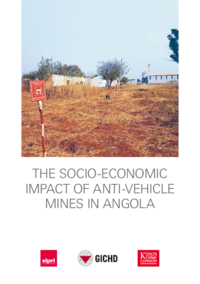This pilot study depicts the impact of anti-vehicle mines (AVM) contamination on socio-economic development and the benefits of AVM clearance on sustainable development. The Sustainable Development Goals (SDGs) are used as a framework to measure the impact of AVM clearance on important sectors such as agriculture, infrastructure, and access to social services. A community-based participatory research approach was used to gather and analyse qualitative and quantitative data in these sectors in two case studies, the provinces of Huambo and Kuando Kubango.
The findings of this study, and the lessons learnt in relation to the methodological approach, will guide the development of additional evidence-gathering exercises regarding the socio-economic impact of mine action.
This study was made possible thanks to financial support from Irish Aid, Department of Foreign Affairs and Trade of Ireland. The research was conducted by the Geneva International Centre for Humanitarian Demining (GICHD), the Stockholm International Peace Research Institute (SIPRI) and King’s College London (KCL).
Categories: Ammunition Management, Sustainable Development Goals (SDGs)

